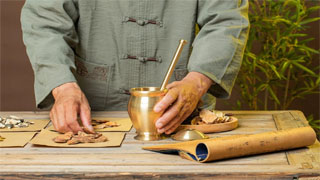
Today we will talk about the health preservation methods for autumn and March in the Yellow Emperor's Inner Canon. The original text is written as follows: "In the third month of autumn, this is called 'Rongping'. When the weather is urgent and the earth's qi is clear, one should lie down early and wake up early. This will bring peace to one's mind, slow down the autumn punishment, restrain one's spirit, make autumn's qi calm, and have no external desires. This is the way to nourish and collect lung qi in autumn. If it is reversed, it will damage the lungs. In winter, it will cause food leakage, and there will be fewer people who offer it for storage
So there are several nouns in this paragraph that need to be explained. The first one is' Autumn March '. What is' Autumn March'? It refers to the three months after the beginning of autumn, usually referring to July, August, and September in the lunar calendar. So what does the term 'autumn punishment' mean? 'Punishment' refers to the aura of killing, so autumn has a kind of autumn aura of killing, causing all things to wither. This aura is called autumn punishment. In autumn and March, this is called Rongping. "Rongping" refers to the form of living organisms, while "ping" refers to peace. So at this time, it is used to describe the season when all things are calm and no longer flourishing, and it is a season of harvest and maturity, so it is called "Rongping".
So the last word is' chuxi ',' winter is chuxi ', and' chuxi 'refers to dinner, cooked food, and food. So what does' winter is for the release of food 'mean? 'Chuxie' refers to the food that is not digested and is expelled, which ancient people called 'not melted after finishing the grain' - that is, what is eaten is pulled. So when food enters the gastrointestinal tract without being digested, it tends to flow out. This usually refers to insufficient yang energy in the kidneys, spleen yang deficiency, and kidney yang deficiency, which can lead to the phenomenon of incomplete digestion.
So what does this paragraph mean when connected? It refers to the three months of autumn, namely July, August, and September. This is the time when all things are in a stable state and when they are ripe and harvested. So the natural world presents a scene of bountiful harvest and calm, with autumn wind coming, clear autumn air, and the heat and humidity sweeping away. The entire weather and atmosphere are very clear. At this time, people should "lie down early and wake up early", slightly later than in spring, and generally wake up at the same time as the chicken starts to move, which is called "getting up with the chicken". That is to say, the activity is corresponding to the chicken. At this time, "making the mind peaceful" is to maintain a stable, peaceful, and tranquil mental state, "to ease the autumn punishment", in order to ease the restraint of the autumn cool air on the human body.
So what does' restrain one's demeanor, make autumn qi calm, have no external aspirations, and clear lung qi 'mean to achieve quietness and calmness? It is necessary to restrain one's thoughts, control one's mood, calm it down, and maintain the autumn killing energy without harming the body. This is the principle and method corresponding to autumn that can maintain the "collection" of this energy in the human body, called the "way of nourishing and collecting". The term 'harvest' here refers to the 'harvest' of the five types of qi: generation, growth, transformation, harvest, and storage. As we mentioned in previous lessons, spring qi is' generation '. Summer is' long ', and in the long summer, it corresponds to the spleen between summer and autumn. At this time, it refers to' transformation ', in autumn it refers to' harvest ', and in winter it refers to' storage '. Therefore, the focus of autumn is on nourishing and harvesting. If it goes against the natural way, it will damage lung qi.
The lung qi referred to here not only refers to the lung function of promoting and descending, the lung qi we use for breathing, but also to the concept of the stored qi throughout the body, the qi stored inside. So winter becomes the season of flatulence, and this autumn harvest is the foundation of winter storage, because if the autumn harvest is not good, winter storage cannot be stored well. What should be stored in winter? When it comes to storing essence and yang qi, it is said that in winter, yang qi should be stored but not, which can lead to "yang deficiency diarrhea". We see that many elderly people, as they age, are prone to not melting their grains and not digesting their food before pulling it out. What does this mean? This indicates that people are aging and losing their vitality. What kind of qi decline? Especially referring to the deficiency and decline of yang qi in the kidneys, there is also a corresponding symptom, which is cold feet and weak legs, all of which are manifestations of yang qi deficiency and decline in the kidneys.
So the corresponding meaning explained in this classic passage is' Winter is for the release of food, and there are few people who offer it to Tibet '. In fact, although the theory of regulating the four qi states the four seasons, it usually corresponds to our human body, referring to the qi that generates, grows, transforms, collects, and stores in the human body, and can also correspond to specific diseases. So if you can't 'collect qi' well in autumn, you may still experience coughing, colds, and cardiovascular problems, especially in autumn when there are many patients coughing. Why? Because there is a kind of dryness in autumn, and this' autumn punishment 'dryness can harm the lungs of the human body. Because the lungs are delicate and delicate, the human body's lungs are the most delicate, and I am particularly afraid of this deadly and dry aura.
Once dry qi harms lung qi, coughing will occur. This type of cough lasts for a long time, mostly dry cough with phlegm, and there are also many cases without phlegm. So what does this phlegm look like? Because autumn is about killing and collecting, many people's phlegm is particularly sticky and difficult to cough up. Some people cough up this thing and it feels very sticky. When they vomit it into the water, it sinks to the bottom, like a small lump that solidifies and becomes very sticky. What is this? This is when the lung qi is damaged by dry qi, and it is no longer nourished. At this time, it should be treated by promoting the lungs, clearing the lungs, moistening the lungs, and resolving phlegm. So, when it comes to the Huangdi Neijing, we should note that there are very few methods for treating diseases mentioned in the Huangdi Neijing, especially the few prescriptions in the Suwen.
So "Lingshu" focuses on the methods of acupuncture and moxibustion, so why is it still regarded as a classic by Chinese medicine? Although it does not discuss specific methods for treating diseases, it provides a valuable idea on how to treat diseases, which is why it is regarded as a classic. For thousands of years, we are still using it today, and many of our ideas are derived from the Yellow Emperor's Inner Canon.
This is the health preservation method for autumn and March. Thank you all.
Disclaimer: This article is a sharing of health knowledge. The drugs, prescriptions, acupuncture and moxibustion and other treatment and health preserving methods mentioned in this article should be applied under the guidance of professional doctors, and should not be applied by yourself. We are not responsible for any issues arising from improper use.


